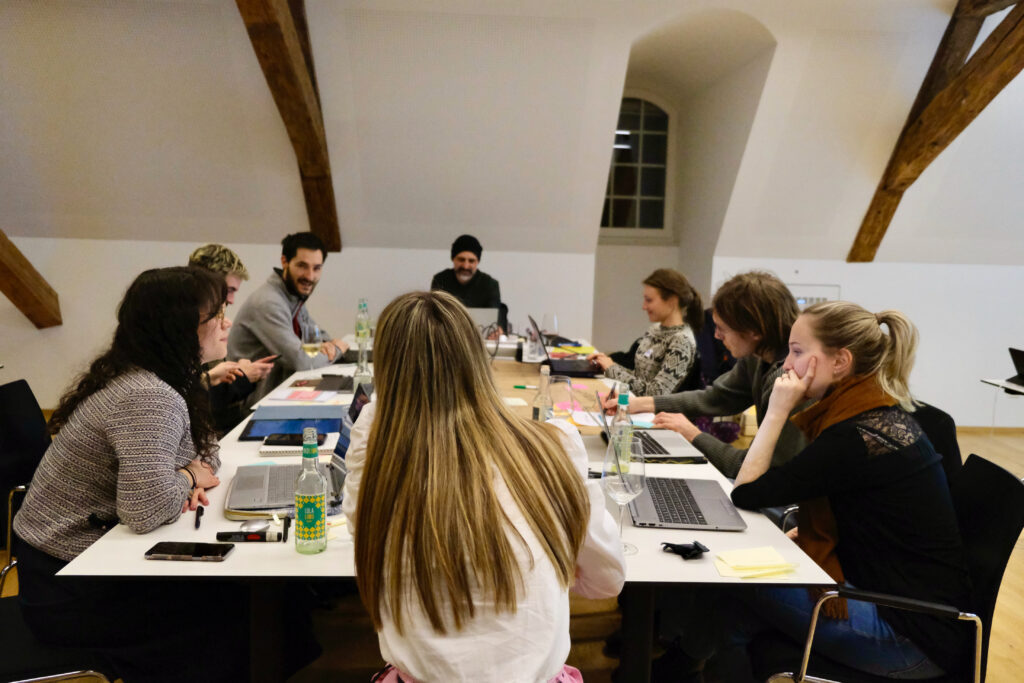This blog has been written by a group of young authors from a variety of academic backgrounds who were brought together by the Hirschmann grant program for students excelling in their studies at Swiss Universities of Applied Sciences. The grant holders worked on a future oriented topic of their choice together, namely their generation’s attitudes towards societal change. The present blog post is part of a four part blog series resulting from an interactive workshop on Policy Kitchen, during which the grand holders were accompanied by foraus. When tasked with reflecting on defining factors for their political journeys, the present group of student authors decided to examine the subjectivity of information sources. In times of near real-time news transmission, social media overload and alternative facts, critical thinking and media competence are crucial skills for anyone wishing to engage with political and societal issues.
By: Florian Pfister, Lydie Vojtechova, Daria Vasileva, Ralph Michel, Natan Ca Zorzi, Isaac Blumenfield, Rebecca Minten
In terms of education, never in the history of humankind have there been more opportunities for up-and-coming generations. In this fast-paced and constantly changing world young people have the knowledge, the ideas, and the energy needed to give our society a boost towards a more radiant future. However, the political power needed to support and coordinate significant change remains firmly in the hands of older generations. There is a gap in opportunities but also of resources: Often is it the older generations owning companies and newspapers, holding high political positions and determining the cash flow of investment. They have the means to shape which innovation will be promoted and what topics will be prominently discussed by the media. This asymmetric allocation of resources leads to a world of powerful old leaders shaping the world of tomorrow, while not seriously considering the needs of the youth.
Creating equitable platforms for intergenerational exchange
Nowadays, an official and formal forum where both young and experienced generations can express their perspectives, beliefs and values, is the exception rather than the rule. The absence of a dedicated, constructive and intergenerational dialogue regularly leads to misunderstandings, a lack of common appreciation, and intolerance among generations. This results ina lose-lose situation for individuals and our community as a whole. What would be beneficial for our society is a mutual understanding and respect for our differences.
So what stops us from constructing a better life together? We must not give in to fears and have the courage to step out of our comfort zone. Many solutions are easily accessible to us. Regular encounters between people of different ages and social positions in everyday life and high-stake formats alike can stimulate dialogue and create bonds between people that might differ greatly upon a first impression. But the mere fact of organizing intergenerational fora is not sufficient. In order for such conversations to happen at eye level and produce meaningful results, resources must be entrusted to younger generations to pursue their ideals. Leaving hierarchy aside and embracing participative action in a co-creative manner, what concrete solutions could we adopt to build an intergenerational bridge?
New impulses to fill in generational gaps
There are already many places where young and old could meet, be it at the dinner table, a citizen assembly or a board room. But we should not hesitate to experiment and take new approaches. With regard to politics, a systematic integration of youth parliaments and sounding boards in the consultation process could help represent the people who will need to live with the consequences of far-reaching political decisions. Another pathway could be a bidirectional mentoring program where younger and older people systematically exchange knowledge and skills. Such a program might consist of larger workshops or smaller tandem groups. To preserve wisdom and bring in new perspectives, citizen organizations could create a framework of meaningful and important life questions for people at various stages in life. Younger students and residents alike might profit from meaningful exchanges through regular visits at retirement homes.
How do you overcome generational conflicts in daily life? What more can we do to engage with individuals from outside our age group with mutual respect and empathy? We must demand that our leaders take decisions based on a holistic assessment of their consequences on individuals at different points in the future. How today’s youth makes their voices heard is the topic of another blog post.




